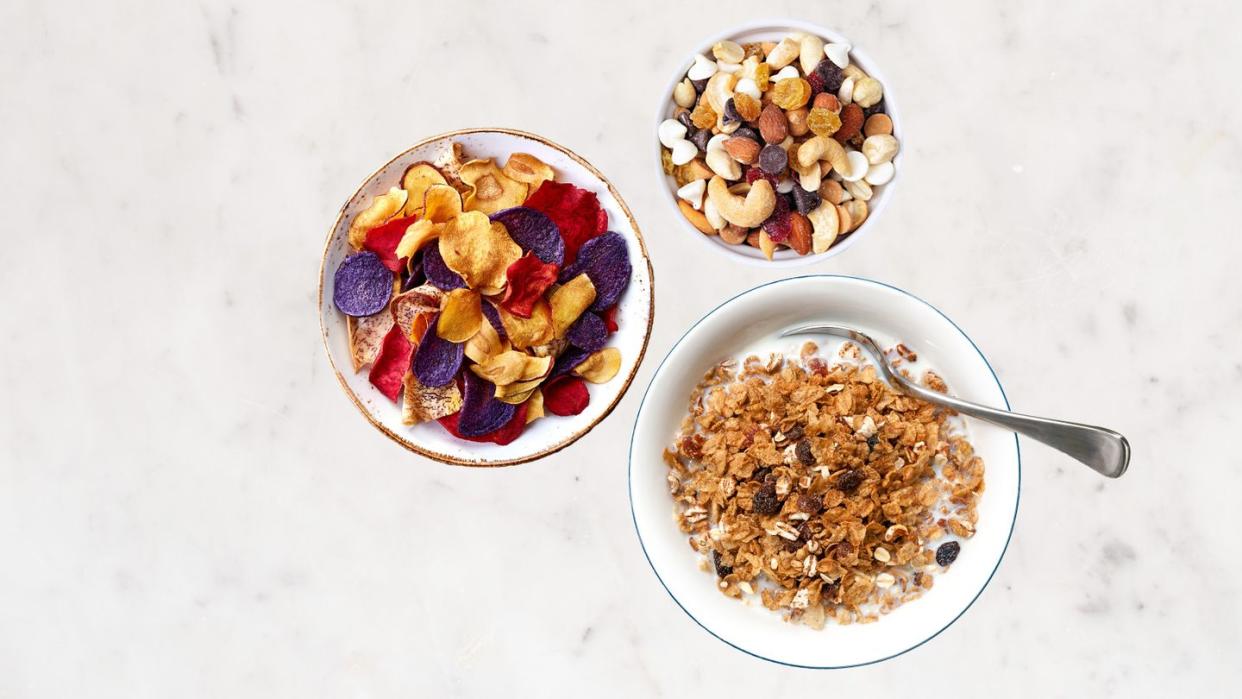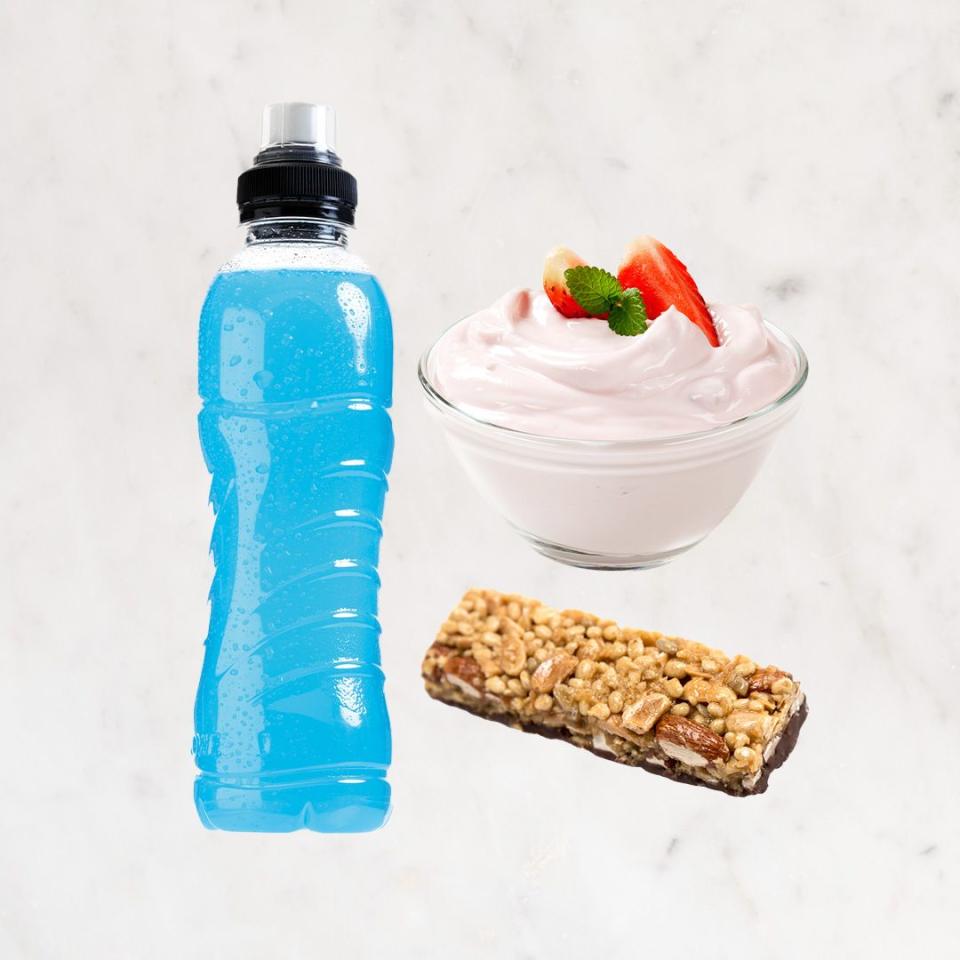13 ‘Healthy' Foods That Dietitians Say Are Overrated

There’s no arguing the nutritional value of certain healthy foods like omega 3-rich salmon or fiber-packed broccoli. On the flip side, TikTok’s candy salad (i.e., dumping a mix of your favorite candies into a bowl) isn’t going to pass as healthy, and most people probably know that.
But somewhere in between those two extremes is a grey area of foods that are often considered "healthy," likely because of some good marketing lingo on their packaging. But when it comes to actual nutritional value, they are overrated, according to registered dietitians we talked to.
A good rule of thumb when looking for something with a nutritional punch? “Healthy food contains protein or fiber, but ideally both,” says Ilana Muhlstein, M.S., R.D.N., a popular TikTok creator who dishes on nutrition.
If you see words like “natural” or “real” on the box, it’s usually a red flag, Muhlstein says. Flip the box over and read the smaller text on the nutritional label, and you’ll probably find ingredients like highly processed corn syrup and artificial colors.
Ahead, dietitians share the 13 foods they think are often overrated when it comes to health claims.
Protein Bars Can Be Glorified Candy Bars
When it comes to products like protein bars, favor the ones that have more grams of protein than they do grams of sugar, Muhlstein recommends.
Agave Nectar Is Mistakenly Considered A Healthy Natural Sweetener
Agave nectar has a lower glycemic index than sugar, so many people assume it's healthier, says Kim Yawitz, RD, a registered dietitian and gym owner in St. Louis, Mo.
“The problem is that agave contains mostly fructose, which the liver converts to triglycerides and LDL (which is the ‘bad’ cholesterol) when you consume too much of it,” she says. “Like sugar, it's best to use it sparingly, or not at all.”
Kombucha Comes With Added Sugar
“Kombucha is often touted as a gut-healthy beverage, but there's really not enough evidence to support these claims,” Yawitz says.
If you're concerned about gut health, focus more on getting plenty of fiber and eating a variety of fermented foods, she suggests.

Some Fruit-Flavored Yogurts Have as Much Sugar as a Serving of Vanilla Ice Cream
Yogurt and fruit are both nutrient-dense foods, so you'd think that fruit-flavored yogurt would be healthy, Yawitz says. But unfortunately, most fruit-flavored yogurt has quite a bit of added sugar.
“You're much better off topping plain yogurt with fresh fruit and adding a bit of stevia if you prefer your yogurt to be sweeter,” she suggests.
Cold-Press Juices Are Stripped of Fiber
Cold-pressed juice makes it easier to consume more fruits and veggies, but drinking it too often can do more harm than good, Yawitz says. Juicing eliminates most of the fiber in fruits and vegetables, and fiber is a nutrient that most people don't get enough of.
“Without fiber, the sugar in juice also hits the bloodstream much faster, which can lead to blood sugar spikes,” she says.
Smoothies are usually a better option if you struggle to eat enough fruits and veggies, Yawitz says, but whole fruits and veggies are even better.
Many Protein Shakes Are Short on Fiber, and High on Added Sugar
While pre-packaged protein shakes can be a way to get in some calories and protein on the go, you’re better off making your own with ingredients like chia seeds for fiber, a high-protein milk, and peanut butter powder, says Amy Bakios, R.D. at Fay, a nutrition platform that offers virtual or in-person consultations with registered dietitians.
Most People Don’t Realize How Much Saturated Fat Is In Nut Butters
Nut butters are great sources of healthy fats and protein, Fay says. But 2 tablespoons contain about 190 calories and 3.5 grams of saturated fat, she points out. (The American Heart Association recommends limiting saturated fat intake to around 0.5-0.6% of calories daily, which is only 11-13 grams daily based on a 2000 calorie daily allowance, Bakios points out).
An alternative that can be used is peanut butter or almond butter powder, she says. Just 2 tablespoons of this powder contains roughly 50 calories and no saturated fat.
Many Cereals List Sugar As the Second or Third Ingredient
Those highly processed cereals can cause your blood sugar to spike and crash before lunchtime, says Maria Emerick, M.S., R.D.N., L.D., and owner of Homegrown Nutrition in Honolulu, Hawaii.
Even the healthy-sounding options like granola can pack a surprising amount of fat, sugar, and unwanted carbs, she says. If you love to start your day with a bowl of cereal, your best bet is to go with a whole-grain option that has at least 5 grams of fiber and fewer than 8 grams of sugar, that’s fortified with vitamins and minerals, she says.
Processed Juices Strip Fiber and Nutrients Found in Skin and Pulp
All fruit juices, whether it's apple, orange, grape or a fancy blend, contain high sugar levels, averaging about 30 grams or eight teaspoons per 8-ounce serving, Emerick says. “Opting for whole fruits provides more fiber and reduces sugar intake,” she says.
Pre-Packaged Trail Mix is Sometimes High in Sodium
You can create your own mix of unsalted nuts and unsweetened dried fruits to keep calorie and sodium levels in check, suggests Yaa Boakye, R.D.N. “Moderation and balance are absolutely key in a healthy diet—no single food can determine overall health,” she says.
Sports Drinks Are Typically High in Sugar
While sports drinks might be beneficial for endurance athletes, others might consider water or electrolyte solutions that don’t have the added sugars, Boakye says.
Granola Can Also Be High in Sugar and Calories
When you’re scanning nutrition labels, look for granolas that don’t have added sugars and that are high in fiber, Boakye says. Or, better yet, make your own granola so you can control the ingredients you’re putting in, she says.
Veggie Chips
If you compare the nutritional labels between veggie straws and potato chips, you won’t see too drastic of a difference. Depending on the brands you’re comparing, the veggie chips may have a little less sodium or slightly fewer calories. But they don’t count as a serving of veggies because the vitamins you’d find in fresh, frozen, or canned veggies have been stripped out.
You Might Also Like


